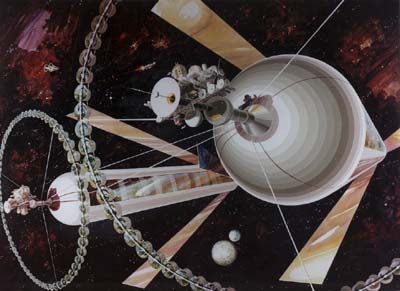Conflating space exploration and commercialization: coverage of PayPal’s announcementby John Hickman
|
| Space tourism is not space exploration. The American West was not won by the wealthy playing cowboy at dude ranches. Space tourism is exotic vacationing for the superrich. |
Reporters tasked to write this news story faced a problem: unless you are an economist or an accountant it is boring subject matter. That it is utterly irrelevant for nearly everyone who might read about it does not help. Science fiction references familiar to mass audiences was one way to deal with the problem. Think Star Trek and The Jetsons rather than the novels of Allen Steele and Alastair Reynolds.
Another was effusing about the rich and famous. Among the names dropped were those of astronaut and author Buzz Aldrin; actors and future space tourists Brad Pitt and Justin Bieber; corporate executives or “tech leaders” Elon Musk, Larry Page, Eric Schmidt, Charles Simonyi, and Paul Allen; and even James Doohan, the deceased actor who first played the character Scotty on Star Trek.
Gushing over celebrities would have been harmless if it hadn’t led to preposterous claims about space as a frontier. In a SPACE.com article, Mike Wall quotes PayPal president David Marcus as saying that working through the problems of currency choice and banking regulation is important, “because private spaceflight is set to open the final frontier up to the masses soon.” The video embedded in the article even includes a voiceover that refers to “interstellar commerce.” Not suborbital, or orbital, or even interplanetary commerce, mind you, but interstellar commerce! What is important about the Marcus quote is the implication that space tourism will happen on the space frontier and that the masses will participate. In reality, neither a brief suborbital flight nor a short stay in a privately owned habitat anchored to some government’s space station—all that space tourism will amount to for years to come—is a journey to a frontier. Space tourism is not space exploration. The American West was not won by the wealthy playing cowboy at dude ranches. Space tourism is exotic vacationing for the superrich. The only role to be played by the masses in space tourism is to feel awe and envy at the extravagance of their social bettors.
In a Fox News article, Michael Roppolo quotes PayPal executive Anuj Nayal as saying, “As we travel through space and explore new planets, we will still need to pay for life on Earth and out there…” There is no indication that he stopped Nayal to ask the obvious. Explore new planets? What new planets?
In a San Jose Mercury News article, Heather Somerville reports without demur the assertions made by entrepreneurs that in coming decades we will see “orbiting hotels, restaurants and cafes, extreme sports on the moon and weeklong stays in a luxury space station—and much of this extraterrestrial infrastructure is already designed and funded.” Nice graphics might be deemed to satisfy the “designed” claim, but the claim that it has already been “funded” ought to have elicited at least a note of skepticism. Even a cursory survey of past news reports would turn up announcements of future orbital hotels that somehow never happened. For example, in 2007 Andrea Thompson reported in SPACE.com that a Galactic Suites hotel would open in 2012.
| What we are meant to believe is that private firms managed by brilliant entrepreneurs can and will take over responsibility for human space exploration from government agencies. |
Forbes reporter Abram Brown’s article conflates space commerce and space exploration with this lead: “If the hallmark of an explorer is to boldly go where no one has gone before, then PayPal is right on track.” Unlike many other members of the press who covered this story, he got the definition of exploration correct. Alas, it was paired with the silly implication that PayPal the corporation will be going anywhere at all in space or alternatively, that using its services in electronic transactions would constitute exploration.
Although it is tempting to simply dismiss all of this as the product of an endemically sycophantic business press, that explanation would overlook the ideological message for the space news audience. What we are meant to believe is that private firms managed by brilliant entrepreneurs can and will take over responsibility for human space exploration from government agencies. We will soon be touring the solar system—or is it the galaxy?—all thanks to the magic of free enterprise.
The problem with this particular millennial vision is that private firms do not open new frontiers. States do. Private firms profit from frontiers after they have been opened by states. The reason for this division of institutional labor is that opening a new frontier involves accepting high risk and absorbing unrecoverable cost. Businesses hate both. That’s why they wait for governments to do the heavy lifting. Mind you, if the real space frontier that lies beyond low Earth orbit is ever reopened to human exploration and opened to economic development, private investment will have an important role to play. However when humans return to the Moon and if they land on Mars for the first time, count on a state to have paid the freight. The real question is not whether but which state will be writing the check.
The persistent anti-statist message in space news coverage is therefore a puzzle. Although it is tempting to think of the reporters as shills for corporate executives, they should be credited with exercising more agency than that. More probably, reporters and the executives they quote or misquote share the same libertarian convictions. That would be harmless if it had no effect on public opinion about space policy. Unfortunately, it leaves the naïve waiting for business to do what only government will.
